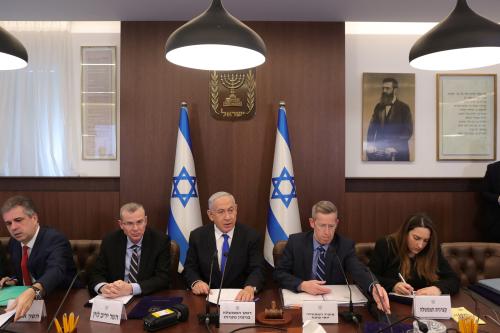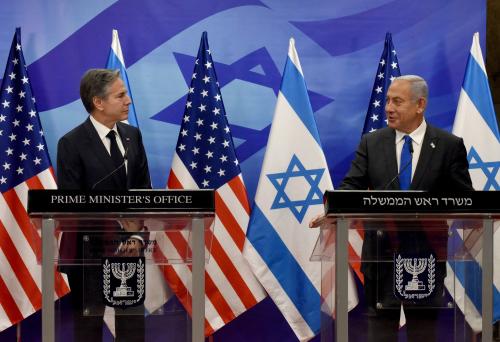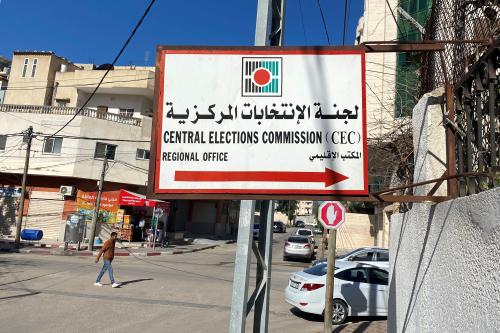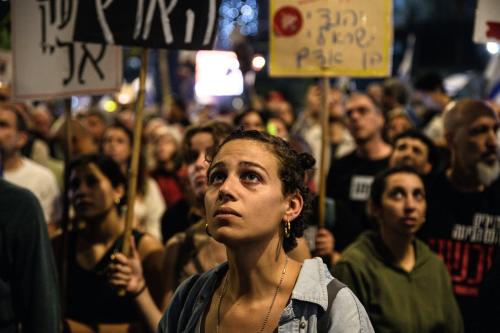In late February, a delegation of British security officials, led by MI6 chief Richard Moore, held a rare visit to the city of Ramallah in the West Bank. Moore met with 87-year-old Palestinian Authority (PA) President Mahmoud Abbas, presumably to discuss how the United Kingdom could further assist the Palestinians to improve the security situation in the West Bank. Like their American counterparts, the British are heavily invested in the survival of the Abbas regime. A small group of British advisors is currently staying in Ramallah to help the PA’s security forces increase their effectiveness. A larger group of American experts, led by Lt. Gen. Michael Fenzel, has recently focused on trying to persuade Abbas to resume the PA’s security activity in two northern West Bank cities, Jenin and Nablus, where a series of recent lethal incidents with the Israelis have occurred. Despite all this outside help, it will be difficult for the embattled Israeli prime minister, Benjamin Netanyahu, to restore calm to the West Bank.
In 2006, after the second intifada gradually died down, the Americans were quite successful in helping the PA regain its police and intelligence capabilities in the West Bank. Abbas was criticized at the time for essentially becoming Israel’s security subcontractor in the West Bank, but it seemed that from his perspective, this situation easily beat the other alternatives. The Ramallah leadership was in a state of panic after Hamas managed to take control of the Gaza Strip in 2007 within six days, killing some Fatah members and deporting others (Hamas had won the 2006 elections, and it feared, with some justification, that Fatah was trying to engineer a coup). Abbas and his men were willing to cooperate with the Israeli security services in order to prevent more terrorist attacks by Hamas against Israeli targets, as long as Israel continued to supply them with information regarding Hamas’s plans for a military coup in the West Bank and other threats to Abbas’ leadership.
In 2014, Israel discovered what it described as a huge Hamas conspiracy meant to violently overthrow the Abbas regime. Yoram Cohen, then the Shin Bet (Israel’s internal security services) chief at the time, met with Abbas in Ramallah and showed him transcripts of investigations of Hamas members, arrested by the Israelis. When Abbas learned of those plans by the enemy from within, he was appalled. A few weeks later, war broke out between Israel and Hamas in Gaza (Operation Pillar of Defense). That meeting with Cohen was one of the main reasons why Abbas chose to stay on the sidelines during the military conflict. The president continued, however, to attack Israel publicly.
Yet, almost nine years later, it seems the West Bank has once again reached a boiling point. It is perhaps too soon to talk of a third intifada. There were many false alarms during the last few years when periods of violence were prematurely described as new uprisings and then suddenly died down. But the situation has seriously deteriorated recently. A period of increased terror attacks began in March 2022 and continued ever since. Since the beginning of this year, more than 60 Palestinians and 14 Israelis died in incidents in Jerusalem and the West Bank. The tension comes at a time of particular weakness for the Abbas regime. Though lucid, the Palestinian president has slowed down his schedule and seems to be less intent on a dialogue with his citizens, who haven’t voted in a general election since 2006. The battle for Abbas’ succession has, in fact, already begun. So much so that last month, Le-Figaro newspaper reported that French President Emmanuel Macron has appointed a team of 15 members to advise him on the identity of Abbas’s successor. The Palestinians, naturally, were furious.
According to public opinion polls held by Palestinian scholar Professor Khalil Shikaki, the PA has hardly been so unpopular among West Bank residents. If, in previous decades, the West Bankers could at least tell themselves that their brethren in Gaza suffered much more economically, then this is slightly less relevant today. Last year, the previous Israeli government decided to allow 17,000 Gazans to work in Israel. A Palestinian worker in Israel could earn many times more than the salary in Gaza for an equivalent job. The Hamas regime, in return for maintaining relative calm in Gaza, is now perhaps as wealthy as it ever was. It is also considered, among a distinct majority of Palestinians in both Gaza and the West Bank, less corrupt than its competition in Ramallah — admittedly a low bar.
The crisis in the West Bank has coincided with an unprecedented political and constitutional crisis in Jerusalem. Netanyahu, reinstated as prime minister last December, is quickly losing control of events. Netanyahu’s main concern, of course, is to avoid jail time — a rather realistic result waiting for him as he has been standing trial for three different cases of corruption at the Jerusalem District Court since May 2021. To avoid that punishment, Netanyahu is willing to fight by any means necessary. This is the background for his so-called legal reform, which is in truth an attempt to drastically change the judiciary, deeply damaging Israeli democracy along the way.
In order to achieve this, Netanyahu has been willing to engage with some strange bedfellows. The most notable of them are two far-right politicians, Itamar Ben-Gvir and Bezalel Smotrich. Ben-Gvir, originally a follower of racist U.S.-born Rabbi Meir Kahane, has always been considered a political lightweight, a professional extremist troll. Suddenly, he is the man in charge of the police, as a minister for national security. Smotrich, slightly less extreme in his views and much more sophisticated, is both the minister of finance and a second minister in the Ministry of Defense, awarded unprecedented authority over civilian matters in the West Bank, in spite of the Israel Defense Forces’ (IDF) serious warnings against such a move. He has already announced that he intends to change the West Bank map by adding more settlements and outposts. His “Plan for Decisive Victory” against the Palestinians, published in 2017 when he was a relatively new minister, makes for a frightening read. Smotrich not only preaches the destruction of the PA, but one gets the notion that if another war breaks and, say, hundreds of thousands of Palestinians lose their homes, he would not shed a tear.
The Biden administration, which is perfectly aware of all this, called a rare conference in the Jordanian city of Aqaba on February 26, looking for ways to increase stability in the region. But while officials from Israel, the PA, the United States, Egypt, and Jordan were discussing confidence-building measures there, terror struck again. Two young men, brothers from an Israeli settlement near Nablus, were gunned down and killed in a nearby Palestinian village as they were driving to their yeshiva (religious school). The search for the killer continues. In response, hundreds of settlers rampaged through the village of Hawara (a pogrom, as one senior IDF officer described it). Dozens of houses, stores, and cars were torched; one Palestinian villager died, as the Israeli army and police mostly watched idly.
That was the moment the Aqaba conference failed. To make matters even worse, both Smotrich and Ben-Gvir publicly attacked their boss, Netanyahu, for even sending a delegation to Jordan and accepting unnecessary American demands to slow down settlement construction. Smotrich went one dangerous step further and announced that Hawara should have been wiped off the face of the Earth by the Israeli army, earning himself a direct condemnation from the U.S. State Department.
Netanyahu is now facing what may be an assembling perfect storm, combining economic unrest, huge protests against his reforms, and growing international criticism. Yet his greatest problem currently may lie in the West Bank. If the lethal attacks against settlers continue, Ben-Gvir will find it hard to remain in the government while his demands for tougher action against Palestinians are not met by Netanyahu, who fears a direct confrontation with the White House. For the Israeli leader, things are bad enough as they are — U.S. President Joe Biden has yet to invite him to Washington since his election victory last November. However, there is currently no coalition without Ben-Gvir. At the most critical point in his political career, Netanyahu is stuck in a deadlock. So far, it seems that the man often described by the Israeli media as a political magician hasn’t figured a way out.










Commentary
Violence in the West Bank is a nightmare for Netanyahu
March 6, 2023